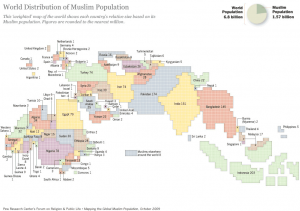The PewForum report on Global Muslim population gave some interesting global statistics:
A comprehensive demographic study of more than 200 countries finds that there are 1.57 billion Muslims of all ages living in the world today, representing 23% of an estimated 2009 world population of 6.8 billion.
While Muslims are found on all five inhabited continents, more than 60% of the global Muslim population is in Asia and about 20% is in the Middle East and North Africa. However, the Middle East-North Africa region has the highest percentage of Muslim-majority countries. Indeed, more than half of the 20 countries and territories1 in that region have populations that are approximately 95% Muslim or greater.
More than 300 million Muslims, or one-fifth of the world’s Muslim population, live in countries where Islam is not the majority religion. These minority Muslim populations are often quite large. India, for example, has the third-largest population of Muslims worldwide. China has more Muslims than Syria, while Russia is home to more Muslims than Jordan and Libya combined.
Of the total Muslim population, 10-13% are Shia Muslims and 87-90% are Sunni Muslims. Most Shias (between 68% and 80%) live in just four countries: Iran, Pakistan, India and Iraq.
My focus is on Malaysia. The map below indicates current Muslim population in Malaysia to be about 17 million or 60.4%. The report says the Malaysian Muslim population is about 16,581,000 which is 1.1% of world Muslim population.
Most likely this figure will grow, and coupled with lower growth rate of other communities, will lead towards a bigger gap between the majority Muslim and minority non-Muslims in the country. As I worried earlier, population imbalance may lead to various problems. Our political situation at the moment is not actually helping to bridge the gap, while the policies for last half decade have only served to widen the gap between the communities. The constitution, which guarantees the rights of the non-Muslims, is often subject to interpretration that seems lop-sided. So, its may well remain words on paper only since the realisation of the constitution is at the hands of politicians and administrators, and the separation between government, judiciary, and legistation is not very clear.
Would a Minorities Act help in this case? A review of the constitution? A check and balance mechanism for all the policies? Population control seems far-fetched of course, at the moment, but may be needed in future.
On hindsight, would an evenly balanced population trigger more social unrest and threat to national security? A minority “Minority” will be easy to subjugate and control.
 Click to enlarge
Click to enlarge

There is no need for a Minorities Act. I strongly am against it. We need a Non-Discrimination Act, and do away with race-based policies. Period.
We shouldn’t be categorized based on religion and ethnicity.